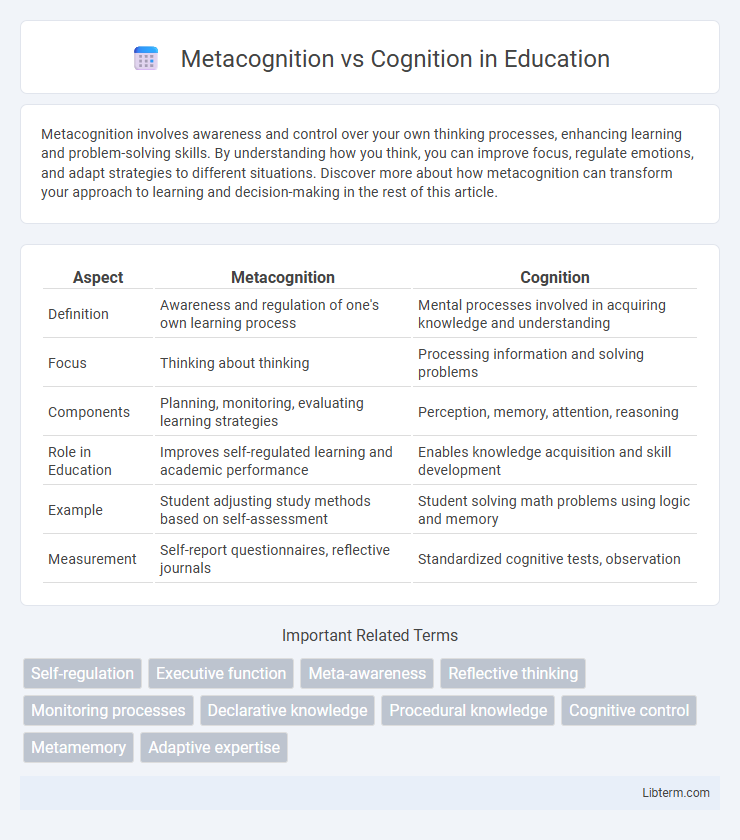Metacognition involves awareness and control over your own thinking processes, enhancing learning and problem-solving skills. By understanding how you think, you can improve focus, regulate emotions, and adapt strategies to different situations. Discover more about how metacognition can transform your approach to learning and decision-making in the rest of this article.
Table of Comparison
| Aspect | Metacognition | Cognition |
|---|---|---|
| Definition | Awareness and regulation of one's own learning process | Mental processes involved in acquiring knowledge and understanding |
| Focus | Thinking about thinking | Processing information and solving problems |
| Components | Planning, monitoring, evaluating learning strategies | Perception, memory, attention, reasoning |
| Role in Education | Improves self-regulated learning and academic performance | Enables knowledge acquisition and skill development |
| Example | Student adjusting study methods based on self-assessment | Student solving math problems using logic and memory |
| Measurement | Self-report questionnaires, reflective journals | Standardized cognitive tests, observation |
Introduction to Metacognition and Cognition
Metacognition refers to the awareness and regulation of one's own cognitive processes, including planning, monitoring, and evaluating learning strategies, whereas cognition involves the mental activities related to acquiring knowledge and understanding through thought, experience, and the senses. Understanding metacognition enhances self-regulated learning by allowing individuals to adapt and control their cognitive functions more effectively. Key components of metacognition include metacognitive knowledge and metacognitive regulation, which directly influence cognitive performance and problem-solving skills.
Defining Cognition: Core Concepts
Cognition encompasses the mental processes involved in acquiring knowledge and understanding through thought, experience, and the senses, including perception, memory, attention, and problem-solving. Core cognitive functions enable individuals to process information, make decisions, and adapt to new situations effectively. Understanding cognition provides the foundation for exploring metacognition, which involves awareness and regulation of these cognitive processes.
Understanding Metacognition: An Overview
Metacognition involves the awareness and regulation of one's own cognitive processes, enabling individuals to plan, monitor, and evaluate their thinking strategies for improved learning outcomes. Unlike cognition, which encompasses the mental processes of acquiring knowledge and understanding through thought, experience, and senses, metacognition functions as a higher-order control mechanism overseeing cognitive activity. This self-reflective capacity enhances problem-solving skills, adaptive learning, and effective decision-making by fostering intentional adjustments based on ongoing assessment of cognitive performance.
Key Differences Between Cognition and Metacognition
Cognition refers to the mental processes involved in acquiring knowledge and understanding, such as perception, memory, and problem-solving, whereas metacognition involves awareness and regulation of these cognitive processes. Key differences include metacognition's role in self-monitoring and controlling cognitive activities, allowing individuals to plan, evaluate, and adjust their learning strategies. While cognition deals with the execution of tasks, metacognition focuses on reflecting upon and managing how these tasks are performed for improved cognitive efficiency.
The Role of Cognition in Learning
Cognition involves the mental processes of acquiring knowledge and understanding through experiences, perception, and reasoning, forming the foundation of learning. It enables learners to process information, solve problems, and store knowledge in memory, which are critical for academic achievement and skill development. Effective cognitive functions support the comprehension and application of new concepts, directly influencing educational outcomes and lifelong learning capabilities.
How Metacognition Enhances Thinking
Metacognition enhances thinking by enabling individuals to monitor and regulate their cognitive processes, leading to improved problem-solving and decision-making skills. It involves awareness of one's own thought patterns, which allows for strategic adjustments during learning and reasoning tasks. This self-regulatory ability increases efficiency and accuracy in processing information, ultimately boosting overall cognitive performance.
Practical Examples of Cognition vs Metacognition
Cognition involves processes like remembering a phone number or solving a math problem, while metacognition refers to awareness and regulation of these cognitive processes, such as realizing you need to use a mnemonic device to recall the number. For instance, a student employing metacognition might assess which study strategies work best after testing themselves, whereas cognition is the act of learning and understanding the material itself. Professional settings also illustrate this distinction: an engineer uses cognition to perform calculations, but applies metacognition to evaluate the efficiency of problem-solving approaches.
Importance of Metacognitive Skills in Education
Metacognitive skills enable students to plan, monitor, and evaluate their own learning processes, leading to more effective and autonomous study habits. These skills help learners identify their strengths and weaknesses, adapt strategies, and improve problem-solving abilities across various subjects. Research shows that fostering metacognition significantly enhances academic performance and lifelong learning capabilities.
Techniques to Improve Metacognitive Awareness
Metacognitive awareness can be enhanced through techniques such as self-questioning, reflective journaling, and think-aloud protocols, which encourage individuals to monitor and regulate their own thinking processes. Implementing goal-setting strategies and regular self-assessment helps learners identify strengths and weaknesses in their cognitive approaches, fostering more effective learning habits. Training in metacognitive strategies, such as planning, monitoring, and evaluating, significantly improves problem-solving skills and academic performance.
Conclusion: Integrating Cognition and Metacognition for Growth
Integrating cognition and metacognition enhances learning by enabling individuals to monitor, evaluate, and regulate their thought processes effectively. This synergy fosters critical thinking, problem-solving skills, and adaptive learning strategies that drive personal and academic growth. Emphasizing both cognitive skills and metacognitive awareness creates a comprehensive framework for continuous improvement and intellectual development.
Metacognition Infographic

 libterm.com
libterm.com